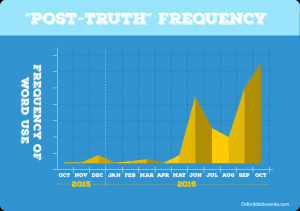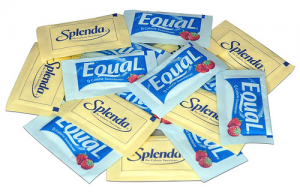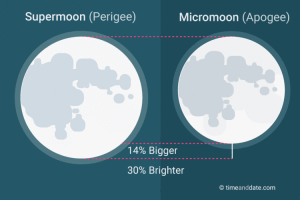Nov
29
2016
 A recent study adds some empirical data to the current discussions regarding online information. This Stanford University study looked at 7,804 student responses across 12 states, divided among middle school, high school, and college students. The goal of the study was to see if these students could distinguish reliable sources of information from fake or unreliable sources.
A recent study adds some empirical data to the current discussions regarding online information. This Stanford University study looked at 7,804 student responses across 12 states, divided among middle school, high school, and college students. The goal of the study was to see if these students could distinguish reliable sources of information from fake or unreliable sources.
Their conclusion?
Overall, young people’s ability to reason about the information on the Internet can be summed up in one word: bleak.
Although students grew up in the internet and social media age, and are very skilled at using online resources, they apparently have not developed the skills to critically evaluate the information they are finding online.
The authors echo what I and many others have pointed out, that while the internet is a great source of information, it is largely a source without editorial filters. As I recently discussed, this has led to a range of outlets including high quality journalism, low quality journalism, advocacy sites, biased sites, advertising, opinion, and fake sites that exist only to drive clicks. Since you no longer need a large infrastructure, or years to build up a reputation and circulation, in order to publish articles that then get shared on social media as news, every kind of information is jumbled together and it is up to the reader to discriminate.
The authors looked at five tasks for each school level that they felt was appropriate for that level. Here are some example results:
Continue Reading »
Nov
28
2016

Lancet Psychiatry has published an opinion piece (which the media is sometimes confusingly referring to as “research”) in which the authors argue that telling children Santa is real may be harmful and immoral. I have to completely disagree with the authors and I think their opinion reflects only their own biases.
Their primary thesis is that if parents tell their children a lie for years, sometimes maintaining that lie with elaborate deception, and the children inevitably discover the lie, that will undermine the child’s faith in the authority of their parents. They write:
“If they are capable of lying about something so special and magical, can they be relied upon to continue as the guardians of wisdom and truth?”
The unstated major assumption here is that it is a good thing for parents to be the, “guardians of wisdom and truth.” That is a value judgement, and one with which I completely disagree. I believe children should be taught to question authority, and as they mature to learn that there are no guardians of truth.
It is a delicate balance. You want people (not just children) to respect appropriate authority, but at the same time realize that no authority is infallible. They can be wrong, and you should think for yourself (while recognizing your own limits). That is the destination, and children should be on a journey toward that destination, not reverence for the guardians of truth.
Continue Reading »
Nov
22
2016
 This post is a follow up to my post from last week on post-truth. The idea that we are living in a post-truth era took off this last year, making it the top pick for Oxford Dictionary’s word of the year. Right on its heels, though, and perhaps a contender for phrase of the year, is “fake news.”
This post is a follow up to my post from last week on post-truth. The idea that we are living in a post-truth era took off this last year, making it the top pick for Oxford Dictionary’s word of the year. Right on its heels, though, and perhaps a contender for phrase of the year, is “fake news.”
Fake news is clearly a thing. There are websites that make up fake news stories for various purposes. Already in the short life of this phrase it has been destroyed by abuse. It is already losing focus and meaning.
It is simultaneously a bug and a feature of the internet that it is a venue for a war of ideas. There is an obvious benefit to this in an open society – the free exchange of information in the marketplace of ideas. Let’s hash it all out with a true democracy of expression and access (well, for those with access).
The bug is that the internet is also a venue for fraud, lying, misinformation, and manipulation. Not everyone is a fair player, and they ruin it for everyone else. In actuality it is not black and white. Rather, there is a spectrum of behavior, and most people are at various points along that spectrum on different issues. At the same time there are extremes, some sites that aspire to a high level of journalism or scholarship, and at the other end sites that are pure fraud, propaganda, or click-bait.
We are collectively still trying to figure out how to deal with the resulting mess. It seems to me that part of the problem is that we are using the internet to address the problems of the internet. Bad actors can therefore hijack or duplicate the mechanisms of quality control and subvert them.
Continue Reading »
Nov
21
2016
The Eagleworks team at NASA have just published a peer-reviewed paper that claims to show net thrust from the EM drive, which is an alleged reactionless thruster – Measurement of Impulsive Thrust from a Closed Radio-Frequency Cavity in Vacuum. They conclude:
Thrust data from forward, reverse, and null suggested that the system was consistently performing with a thrust-to-power ratio of 1.2±0.1 mN/kW1.2±0.1 mN/kW.
The paper concludes that they measured a consistent, although very small, amount of thrust in one direction. This claim remains highly controversial, for good reason. The claim is that they can convert electricity into thrust by creating a tapered resonant chamber. The radio waves produced bounce around the chamber, but because of its tapered shape they push off one side more than the other.
The problem with this claim, and the reason it remains controversial, is because it would break the laws of physics as we currently understand them. Specifically it would break the conservation of momentum – for every action there is an opposite and equal reaction (hence “reactionless” drive).
Further, such a drive could potentially result in a free energy machine. At high enough speed the energy of the momentum generated by the thrust would be greater than the electrical energy used, therefore creating net energy. You could argue that at higher speeds the drive is less and less effective, but there is no reason to suspect that would be the case.
Continue Reading »
Nov
18
2016
 No GMO currently on the market has a trait that is designed to increase crop yield. What some traits do, usually by incorporating pest resistance or drought resistance, is to reduce crop loss and improve the predictability of crop yield, which is critical for farmers.
No GMO currently on the market has a trait that is designed to increase crop yield. What some traits do, usually by incorporating pest resistance or drought resistance, is to reduce crop loss and improve the predictability of crop yield, which is critical for farmers.
One of the promises of GM technology, however, is that it will produce traits that will increase the potential yield of crops, allowing for the production of more food from a given amount of land. A recent study published in Science reports a significant success in doing just that, using a modification that I have not even heard of before.
I always love when that happens. I read a lot of science news, and therefore I tend to see any big advances coming because there is often a buzz for many years before the technology is ready. Every now and then a new technology or discovery hits without warning. It reminds me that there are researchers working away without hype or attention but with the potential for significant discoveries at any time.
Improving Photosynthesis
If we want to increase the amount of plant matter that can be produced from one plot of land, then we will need to increase the efficiency by which those plants convert sunlight into food. There are many potential ways to do that, but the most direct way is to improve the efficiency of photosynthesis itself. Sunlight is a fairly fixed input, so we want to turn as much of that sunlight as possible into food.
Continue Reading »
Nov
17
2016
 The Oxford Dictionary word of the year is “post-truth” which they define as:
The Oxford Dictionary word of the year is “post-truth” which they define as:
an adjective defined as ‘relating to or denoting circumstances in which objective facts are less influential in shaping public opinion than appeals to emotion and personal belief’.
The implication is that we are now living in a post-truth era. Many people would probably point to the outcome of the recent presidential election as evidence of this. Of course there were many factors influencing the election and it’s impossible to tease them all apart, but this seems to legitimately be a factor.
Trump has 15 million Twitter followers, which means that more people likely see his tweets than will watch any news broadcast. Trump just appointed Stephen Bannon to be his chief White House strategist. Bannon was the chairman of Brietbart news, a far right propaganda echochamber.
Continue Reading »
Nov
15
2016
 Stories take on a life of their own. That is the origin of urban legends, myths, and even religion. A good narrative feeds on itself and can be self-sustaining. It evolves and adapts and finds fertile ground in most human hosts (unless they have been inoculated with a sufficient dedication to facts and logic).
Stories take on a life of their own. That is the origin of urban legends, myths, and even religion. A good narrative feeds on itself and can be self-sustaining. It evolves and adapts and finds fertile ground in most human hosts (unless they have been inoculated with a sufficient dedication to facts and logic).
Aspartame, an artificial sweetener that was approved by the FDA in 1981, has been the focus of conspiracy theories ever since. The “holistic medicine” and “natural health” subcultures have largely been responsible for spreading misinformed hysteria about aspartame, first through chain letters and newsletters, and now through the internet.
Ever adapting, they have added some new wrinkles to the legend of aspartame, making sure that their baseless fearmongering is making use of the latest buzzwords.
Aspartame is Safe
First for some background, the anti-aspartame brigade claims that this food additive has been linked to cancer, neurological disorders, and a long list of complaints and diseases. They are simply lying, or the equivalent of lying by cherry picking data, dismissing evidence out-of-hand, and making up whatever claims they need to support their position. Continue Reading »
Nov
14
2016
 On November 6th Nigel Antony Gray predicted on his Facebook feed:
On November 6th Nigel Antony Gray predicted on his Facebook feed:
“Heads Up: On 14th November and a couple of days either side of that date, watch for a major earthquake, and quite possible in South Pacific area.”
On November 13th there was a magnitude 7.5 Earthquake on the south island of New Zealand. So far the death toll is two people. This was a significant quake along a known fault line that runs through the south island.
The internet was apparently very impressed with this prediction. Gray has long argued that earthquakes can be predicted by looking at the lunar cycle, because of the tidal forces of the moon on the earth. He is particularly fond of supermoons – when the moon is at perigee, the closest point in its orbit around the earth.
Supermoon
Tonight will be the most super supermoon since 1948. Last night and tonight the full moon will appear slightly larger than you are used to. You will not notice this difference, however. If you saw pictures of the apparent size of the moon side by side you can see the slight difference, but you would never notice it just by viewing the moon.
Continue Reading »
Nov
11
2016
 Donald Trump is our president-elect. Dramatic transitions are always anxiety-provoking, partly because of the unknown, and since Trump has never held public office there is a lot of uncertainty.
Donald Trump is our president-elect. Dramatic transitions are always anxiety-provoking, partly because of the unknown, and since Trump has never held public office there is a lot of uncertainty.
I do think, as Obama and Clinton have expressed, that it is important that we respect the outcome of our democratic process and a peaceful transfer of power, even if we don’t like the results. I disagree with the current protests (it’s too late, the election is over). Similarly, I disagree with the trend in the last two decades of challenging the legitimacy of the president. This started with Bush’s win over Gore, and has been an element of every election since. Trump himself has done a lot to undermine confidence in the process and its results.
While I further agree with Clinton that we should give Trump a chance to be a good president, and Democrats should even try to work with him, he is not a blank slate. He said a lot in the campaign that is worrisome. He will now be judged by what he says and does as president-elect during the transition, and of course by his actions as soon as he takes office. Continue Reading »
Nov
10
2016
 Last week I wrote a response to a NYT article on GMOs. Massimo Pigliucci wrote a critical analysis of my response. I then responded to that piece.
Last week I wrote a response to a NYT article on GMOs. Massimo Pigliucci wrote a critical analysis of my response. I then responded to that piece.
Below is the final round of responses on this issue, one from Massimo and then a final response from me. In this round Massimo changes the focus from GMOs specifically to how the skeptical movement handles such issues.
My (further) response to Novella on GMOs
by Massimo Pigliucci
I promise, this is the last round concerning this particular discussion, at the least on my part. To recap: Danny Hakim, an investigative reporter for the New York Times, published a critical piece on certain aspects of GMO technology; my friend and fellow skeptic Steve Novella responded; I commented critically on Steve’s response; and he responded to my criticism. The current post, however, isn’t going to be yet another blow-by-blow affair, for a few reasons: i) it would be even longer than the last installment, which I fear would severely test readers’ patience; ii) there is a diminishing return to going deeper and deeper and insert more and more qualifications to any argument; and iii) it seems to me that most of what Steve and I wanted to say has been said already.
So let me try to zoom the discussion out a little, shifting attention to what I think are some background issues of which this exchange has been a particular instantiation.
Continue Reading »
 A recent study adds some empirical data to the current discussions regarding online information. This Stanford University study looked at 7,804 student responses across 12 states, divided among middle school, high school, and college students. The goal of the study was to see if these students could distinguish reliable sources of information from fake or unreliable sources.
A recent study adds some empirical data to the current discussions regarding online information. This Stanford University study looked at 7,804 student responses across 12 states, divided among middle school, high school, and college students. The goal of the study was to see if these students could distinguish reliable sources of information from fake or unreliable sources.

 This post is a follow up to my post from last week on
This post is a follow up to my post from last week on  No GMO currently on the market has a trait that is designed to increase crop yield. What some traits do, usually by incorporating pest resistance or drought resistance, is to reduce crop loss and improve the predictability of crop yield, which is critical for farmers.
No GMO currently on the market has a trait that is designed to increase crop yield. What some traits do, usually by incorporating pest resistance or drought resistance, is to reduce crop loss and improve the predictability of crop yield, which is critical for farmers. The Oxford Dictionary word of the year is
The Oxford Dictionary word of the year is  Stories take on a life of their own. That is the origin of urban legends, myths, and even religion. A good narrative feeds on itself and can be self-sustaining. It evolves and adapts and finds fertile ground in most human hosts (unless they have been inoculated with a sufficient dedication to facts and logic).
Stories take on a life of their own. That is the origin of urban legends, myths, and even religion. A good narrative feeds on itself and can be self-sustaining. It evolves and adapts and finds fertile ground in most human hosts (unless they have been inoculated with a sufficient dedication to facts and logic). On November 6th Nigel Antony Gray predicted on his Facebook feed:
On November 6th Nigel Antony Gray predicted on his Facebook feed: Donald Trump is our president-elect. Dramatic transitions are always anxiety-provoking, partly because of the unknown, and since Trump has never held public office there is a lot of uncertainty.
Donald Trump is our president-elect. Dramatic transitions are always anxiety-provoking, partly because of the unknown, and since Trump has never held public office there is a lot of uncertainty. Last week I wrote a response to a
Last week I wrote a response to a 




